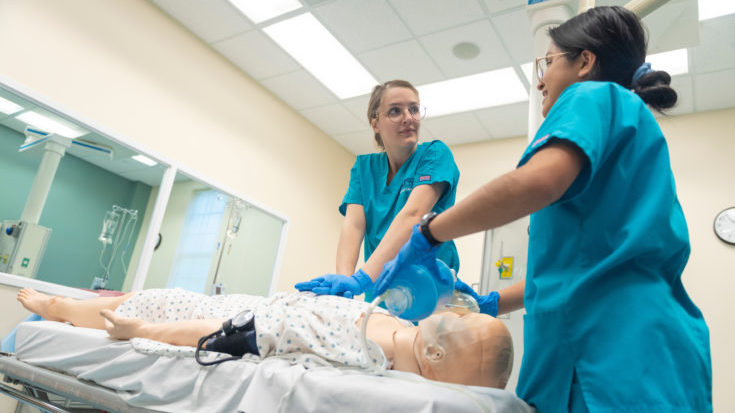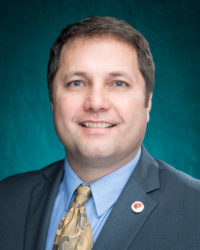
The first
Establishing the first Entry to Practice baccalaureate degree program in North Carolina through the University of North Carolina Wilmington (UNCW) is an honor and distinction recognized within the profession, UNCW, and our community partners. Our community in Wilmington, North Carolina, has more than doubled in population since 2010. The population in North Carolina is growing rapidly, and nearly 16.7% of the 10.5 million North Carolinians are 65 years of age or older, according to the U.S. Census Bureau. The demands placed upon our professionals in the workforce continue to grow across the country, and we are responding.
According to Dr. Charles J. Hardy, founding dean for the College of Health and Human Services, as found on their website, “The UNCW College of Health and Human Services was established to make a positive impact on the health and quality of life of residents in the state of North Carolina and beyond.”
Our respiratory therapy program is part of this mission through the Entry to Practice program and the Degree Advancement option for associate graduates.
The mission
Our profession has been asked, and responded to, the growing need for a highly-skilled workforce when caring for patients with cardiopulmonary diseases. Over the years, our professional education has evolved from hospital-based on-the-job training to programs delivered in higher education institutions with Entry to Practice options ranging from the associate to master preparation. The competencies necessary for respiratory therapists today go beyond the vocation and expand the scope of practice that highlight skills necessary in various health care settings.1 The growing demands placed upon our profession are a reflection of the growing need for services from within the health care community. Competencies internationally recognized include interprofessional communication skills, evidence-based approaches to care, increased research, and disease management approaches to healthcare delivery.2 Competencies associated with information literacy can influence approaches to care when developing disease management strategies for COPD patients in North Carolina to reduce readmission rates for patients.3,4 We must consider how these transferrable skills can impact other patient populations in several health care settings where respiratory therapists care for patients and families.
The setting
The College of Health and Human Services’ Respiratory Therapy Program embraces a liberal arts approach to preparing outstanding respiratory therapists. A liberal arts education enhances clinical practice and holistic care through improved communication skills, scientific reasoning, and analytical skills. Liberal arts also promote a more engaged citizenry through greater cultural awareness, the ability to navigate diversity, ethical decision-making, social justice, systems thinking, and improved self-care. Finally, a liberal arts base promotes the evolution of the field beyond vocational practice alone. By exposing students to the liberal arts through our University Studies program (US), UNCW elevates them into a more holistic citizens of our local and global communities.
The School of Health and Applied Human Sciences (SHAHS) undergraduate programs include exercise science, healthful living and fitness, public health, recreation therapy, tourism-recreation & sport and finally, respiratory therapy. The graduate programs within the SHAHS include applied gerontology, athletic training, health care administration, and degrees in physical education & health specialization. Along with the School of Nursing and School of Social Work, these programs provide a wide variety of opportunities to collaborate on interprofessional education and simulation within the College of Health and Human Services. Our plans to grow additional programs and serve the community provide a rich environment for collaboration across many disciplines within a culture of faculty and staff who are willing to take part.10
Training
Our program attracted faculty from across the country to join our team. Upon arrival from Florida, Texas, Tennessee, and North Carolina, each professional brings perspectives and experiences that complement our curriculum. Our combined experiences will shape the training of our students. Students will also work interprofessionally with and learn from other degree programs in a 10,000 square foot simulation learning center we share with the School of Nursing.5 This state-of-the-art facility features 11 rooms, including an intensive care unit, pediatric and neonatal spaces, a surgical suite, a hospital ward with nurse’s station, assessment rooms, skills labs, a simulated home environment, simulated electronic medical record system, an electronic patient medication dispenser, and high and low fidelity simulation equipment. The use of simulation and a growing standardized patient program will complement the student experience.6,7 Students will use research articles to annotate topics associated with a patient population as part of the curriculum to better understand disease management.
Timing
In the growing demand for respiratory therapists, the novel coronavirus thrust our profession into the spotlight. According to the U.S. Bureau of Labor Statistics, respiratory therapy will see a faster than average job growth rate at approximately 19% over the next 10 years. The role of respiratory therapists to recommend and implement effective strategies for patients on mechanical ventilation is evident during the first wave of the COVID-19 pandemic. Invasive and non-invasive approaches were used during physiologic conditions unique to COVID-19 patients.8 The appraisal of alternative strategies to oxygenate patients experiencing type 1 respiratory failure within the COVID-19 patient population reflects the need for critical thinking and evidence-based approaches to care.8 This is happening as the population is aging quickly, and seasoned respiratory therapists are entering retirement age. The need for more RTs who are highly-skilled, ready to advance their practice, enter leadership roles, and contribute through research to evidence-based practices is evident.
Next steps
During the July board meeting, the Commission on Accreditation for Respiratory Care has approved our application for provisional accreditation for the Entry to Practice program. As a result, our clinical partners are ready to participate in the most critical aspect of training within the program: clinical practice. Our partners understand the need to help develop the competencies necessary for future respiratory therapists. Growing baccalaureate and graduate degree options in respiratory therapy are a pathway to meet all 66 competencies outlined in the 2015 and Beyond papers.10
References
- Barnes TA, Gale DD, Kacmarek RM, Kageler WV. Competencies needed by graduate respiratory therapists in 2015 and beyond. Respir Care. 2010;55:601–16.
- Sreedharan, JithinK, and SureshG Nair. “Fostering Quality in Respiratory Therapy Education – A Need of the Hour.” Indian Journal of Respiratory Care 10, no. 2 (2021): 167. https://doi.org/10.4103/ijrc.ijrc_52_21.
- Lippmann, Steven J., Karin B. Yeatts, Anna Waller, Kristen Hassmiller Lich, Debbie Travers, Morris Weinberger, and James F. Donohue. “COPD-Related ED Visits in North Carolina: Hospitalizations and Return Visits.” Online Journal of Public Health Informatics 5, no. 1 (March 23, 2013). https://doi.org/10.5210/ojphi.v5i1.4408.
- Fascia, Wendy, and Jennifer Pedley. “Respiratory Therapists in a Primary Role as Disease Manager.” Canadian Journal of Respiratory Therapy: CJRT = Revue Canadienne de La Therapie Respiratoire: RCTR 54, no. 4 (2018). https://doi.org/10.29390/cjrt-2018-023.
- Russell, Kendra, Jasmine Brown, Leanne Manella, James Colquitt, and Donna Ingram. “Interprofessional Education: TeamSTEPPS® and Simulation With Respiratory Therapy and Nursing Students in Their Final Year.” Nursing Education Perspectives 41, no. 5 (September 2020): 294–96. https://doi.org/10.1097/01.NEP.0000000000000717.
- Vernon, Marlo M, Nicole M Moore, Lisa-Anne Cummins, Stephanie E Reyes, Andrew J Mazzoli, Vahe Heboyan, and Gianluca De Leo. “Respiratory Therapy Faculty Knowledge of and Attitudes Toward Interprofessional Education.” Respiratory Care 62, no. 7 (July 2017): 873–81. https://doi.org/10.4187/respcare.05034.
- Beachey, Will D. “A Comparison of Problem-Based Learning and Traditional Curricula in Baccalaureate Respiratory Therapy Education.” Respiratory Care 52, no. 11 (November 2007): 1497–1506.
- Sovani, Milind, Arun Khanna, Dipansu Gosh, Ben Messer, and Simon Wharton. “Should Awake Proning Be Used before Continuous Positive Airway Pressure Therapy for Respiratory Support in COVID Pneumonia.” Lung India 37, no. 6 (2020): 558. https://doi.org/10.4103/lungindia.lungindia_516_20.
- West, Andrew J., and Gale Parchoma. “The Practice of Simulation-Based Assessment in Respiratory Therapy Education.” Canadian Journal of Respiratory Therapy: CJRT = Revue Canadienne de La Therapie Respiratoire: RCTR 53, no. 1 (2017): 13–16.
- Kacmarek, Robert M, Thomas A Barnes, and Charles G Durbin. “Survey of Directors of Respiratory Therapy Departments Regarding the Future Education and Credentialing of Respiratory Care Students and Staff.” Respiratory Care, 2011. https://doi.org/10.4187/respcare.01360.
Email newsroom@aarc.org with questions or comments, we’d love to hear from you.















